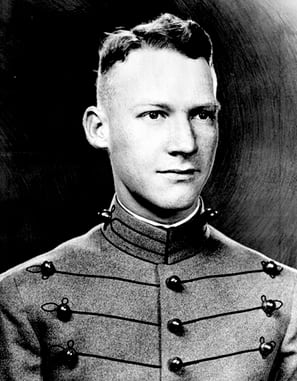Lt. Alexander Ramsey “Sandy” Nininger, Jr. wasn’t the type of soldier people would have expected to become a World War II hero when he first entered active service in 1941.
After being commissioned, Nininger “wrote a friend to say that he had no feelings of hate, and did not think he could ever kill anyone out of hatred,” author Malcolm Gladwell wrote in The New Yorker. “He was quiet by nature, loved the theatre, and used to sit in his commanding officer’s room drinking tea and listening to Tchaikovsky.”
It may have come as a surprise, then, when Nininger requested to be assigned to a company in the thick of combat.
He got his wish when he was attached to the 57th Infantry Regiment, the legendary Philippine Scouts, who were tasked with the daunting mission of halting an all-out Japanese invasion of the Philippine Islands.

On January 12, 1942, Nininger and his vastly outnumbered and outgunned men were digging in on Bataan in preparation for battle when the young lieutenant recognized that his unit was assigned to cover a sector largely removed from the most intense fighting.
Knowing that an adjacent company was fully immersed in a counter attack, Nininger volunteered to leave his unit and join in the fight to retake positions that had been overrun.
Once attached to Company K, the order was given to repel the enemy attack. Nininger wasted no time, charging forward with astonishing fury as men around him dropped like flies to enemy sniper and machine gun fire.
Shot several times, Sandy pressed on far ahead of his men and deep into enemy territory, killing snipers and machine gunners by meticulously moving from foxhole to foxhole, attacking the dug-in Japanese with his rifle, grenades and with the enemy’s own weapons in fierce hand-to-hand combat.
Nininger eventually succumbed to his rapidly mounting wounds. His men later found his body in a foxhole along with three dead Japanese laying around him.
RELATED

“It is difficult to say how many Japanese were slain by Nininger,” the Naval Air Station Fort Lauderdale Museum wrote of the lieutenant, “but piece by piece his men were able to trace his path of destruction.”
Lt. Nininger’s fierce bravery in the face of sure death inspired the rest of his men to continue the counterattack, and in that pivotal moment, the momentum of the entire war in the Pacific shifted.
Gen. Douglas MacArthur would later say that the successful Jan. 12, 1942, counter attack provided him with critical time needed to organize defenses for Corregidor and Manila Bay.
Weeks after Nininger was killed, President Franklin D. Roosevelt learned of the 23-year-old lieutenant’s heroism. He posthumously awarded Lt. Nininger the Medal of Honor on Jan. 29, making him the very first Army soldier to receive the Congressional Medal of Honor during World War II.
For more, read his full Medal of Honor citation or his biography from his home-town museum in Ft. Lauderdale, Florida.
J.D. Simkins is the executive editor of Military Times and Defense News, and a Marine Corps veteran of the Iraq War.




